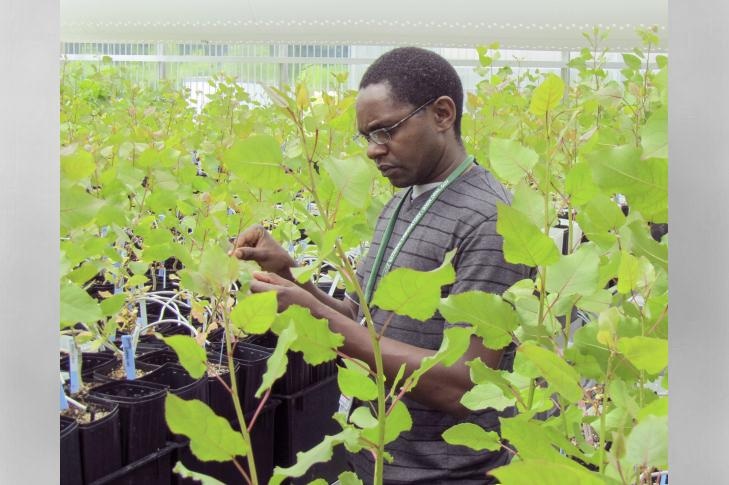Sep 26 2016
 ORNL lead inventor Wellington Muchero and his team studied natural genetic variants of poplar trees with lower lignin content that best benefits ethanol production. (Credit: Oak Ridge National Laboratory)
ORNL lead inventor Wellington Muchero and his team studied natural genetic variants of poplar trees with lower lignin content that best benefits ethanol production. (Credit: Oak Ridge National Laboratory)
An Oak Ridge National Laboratory technology, based on the detection of a gene in poplar (Populus trichocarpa), has been licensed by GreenWood Resources. This technology would make it easier to transform poplar trees into biofuels.
GreenWood, an international timberland investment and asset management company operating in Oregon, aims to market the technology to choose and breed improved varieties of poplar with minimal lignin content, which eases the conversion process and eventually minimizes the total costs of biofuel production.
Researchers from the Department of Energy’s ORNL, the University of Tennessee and West Virginia University, led by Wellington Muchero, identified a gene connected to the synthesis of lignin, an important component of plant cell walls that offers sturdiness but prevents the production of biofuels. When a poplar tree is grown with reduced lignin, it would offer easier access to the plant sugars that are transformed into renewable fuels.
The team’s research demonstrated that the gene could decrease lignin content by nearly 50% and raise the ethanol production up to 250% on biomass that was not mechanically or chemically pretreated.
We began with field studies, looking at poplar trees growing in their natural environment as well as experimental field sites in the Pacific Northwest region, and found naturally occurring genetic mutations that caused the most lignin reduction in these trees.
Wellington Muchero, ORNL
The team established that plants bearing a variant of the lignin-producing gene demonstrated an increase in sugar discharge of up to 280%, which caused the 250-percent increase in ethanol yield.
“What sets this discovery apart from similar studies is that this technology represents a 25 to 50 percent reduction in lignin content with a single gene, and the plants are still healthy, which is quite remarkable,” said Thomas Zacharia, deputy director for science and technology at ORNL. Former research in poplar and other biofuels crops has shown reductions ranging between 5 and 10 percent, frequently resulting in plants that did not perform well in field tests.
GreenWood has licensed the genetic technology created by the ORNL-based BioEnergy Science Center. They will carry their partnership with ORNL as they perform field studies in the coming years to confirm the advantages of this unique plant system in GreenWood’s commercial options. The technology could also promote commercial opportunities in the pulp and paper sector.
Incorporating this technology into GreenWood’s poplar breeding program will lead to a new, superior class of bioenergy plantation varieties with which biorefineries can produce transportation fuels at a reduced cost, owing to significant savings during the pretreatment and enzymatic hydrolysis stages. This technology will accelerate GreenWood’s efforts to improve biomass chemical composition that is important in helping move the United States toward energy independence.
Brian Stanton, Chief Science Officer, GreenWood
Along with Muchero, co-inventors of the technology include ORNL’s Jin-Gui Chen, Lee E. Gunter, Sara Jawdy, Anthony C. Bryan and Gerald A. Tuskan; Stephen P. DiFazio, WVU, and Hao-Bo Guo, UT.
This research received funding from BESC, a U.S. Department of Energy Bioenergy Research Center supported by the DOE Office of Science, and the technology matured under ORNL’s Technology Innovation Program.